Virginia Firearm Bill of Sale Form
Virginia firearm bill of sale is a document that the buyer and seller should complete to receive mutual guarantees of a lawful transaction of an item. Purchase and sale of firearms is legal in Virginia, both in shops and via private transactions, so the bill of sale document is an additional guarantee for both parties in the proper transaction process, evidence of the change of ownership, and recording of the gun’s technical characteristics at the moment of sale.
Virginia bill of sale forms – visit to get more Virginia-related bill of sale documents that you might need.
A bill of sale gives both parties certain rights and obligations. Are you sure you know about all of them? If not, visit our general bill of sale page first – https://formspal.com/bill-of-sale/.
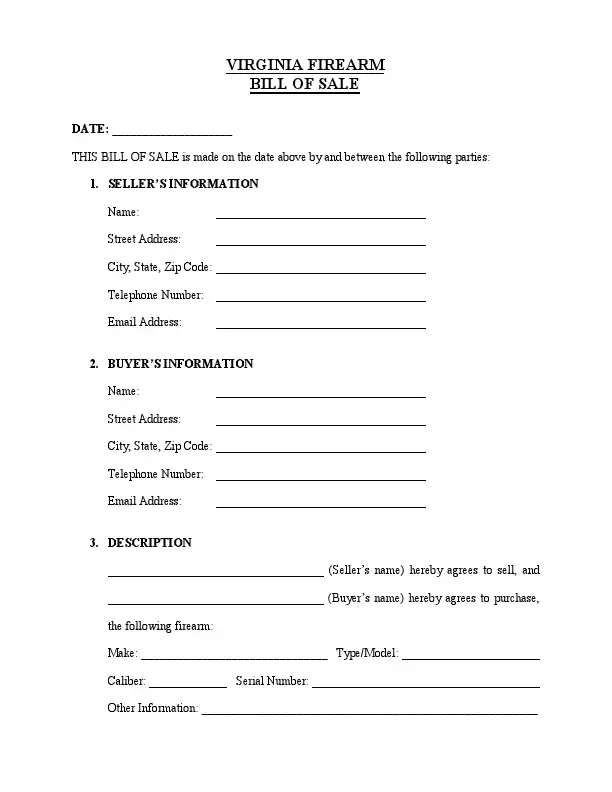
Build Your Document
Answer a few simple questions to make your document in minutes
Save and Print
Save progress and finish on any device, download and print anytime
Sign and Use
Your valid, lawyer-approved document is ready
Registering a Gun in Virginia
First, the seller of a firearm should keep in mind the limitations of private firearm sale posed by the state gun laws:
- Only handguns can be sold privately (more serious firearms with greater calibers should be sold via official organizations)
- The sale can be completed only with a Virginia state resident
- The buyer should be at least 18 years old
- If the subject of the purchase is an FFL gun, then the buyer should be at least 21 years old
No background check is required during a private gun sale. If an individual wishes to buy a firearm from an official dealer, they need to provide a personal ID and some secondary identification documents.
The Virginia State Police have developed a firearms transaction program setting the requirements for approval or refusal for the sale or transfer of firearms in the territory of Virginia. The program started in 1989 and still operates to guarantee population safety while at the same time not infringing on the Virginia residents’ right to obtain and possess firearms.
The VCheck (verification of the buyer’s identity and residence) is done by firearms dealers authorized by VFTP; it represents a regular background check of the person via the State Police firearms transaction system. Criminal information is never disclosed. Dealers wishing to sell firearms and complete VCheck of their clients should complete the SP-69 form for licensing. VCheck allows a comprehensive background check via several state and federal databases, including the National Instant Criminal Background Check System (NICS), the National Crime Information Center (NCIC), the Virginia Criminal Information Network (VCIN), etc. In case the buyer is not indicated in any of these databases, the VCheck result shows “APPROVED,” while identification by any of the criminal databases results in the “DELAYED” outcome. The applicant is then offered to attend a local police department to clarify the reasons for denial.
If a buyer wants to purchase a firearm from a resident of another state, the parties have to arrange the deal with the help of an official FFL dealer in Virginia. A fee of $25 will be charged for such a transaction. Concerning gun laws, Utah has some specific limitations for the gun owners, such as the conceal carry permit (rules for the permit are laid out in § 18.2-308 of the Code of Virginia).
Virginia Firearm Purchase Details
| Subject | Long Guns | Hand Guns |
| Registration of a Firearm | Not required (machine guns are required to be registered with the state police) | Not required (machine guns are required to be registered with the state police) |
| Permit to Purchase | Not required | Not required |
| Concealed Weapons Permit Fee | No more than $50 | |
| Background Check for Private Sales | Required | Required |
| Persons Prohibited from Carrying Firearms | Virginia Code, Sections 18.2-308.1:1 to 1:6 and 18.2-308.2 | |
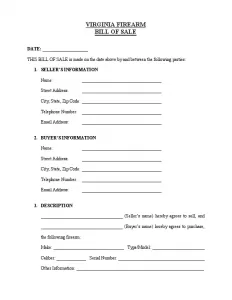
How to write Virginia Firearm Bill of Sale
The guidelines below are based on our bill of sale form. However, should there be a document supplied by your local officials, it’s recommended to choose it for the deal.
Step 1: Indicate the date when document is created.

Step 2: Enter the seller’s and buyer’s particulars:
- Full name
- Address: Street, City of residence, State of residence, Postal code
- Contact details: Cell phone number, Valid email address

Step 3: Fill in the information concerning the firearm you’re trying to sell:
- Manufacturer
- Type/Model
- Caliber
- Serial Number
- Other information you deem crucial.
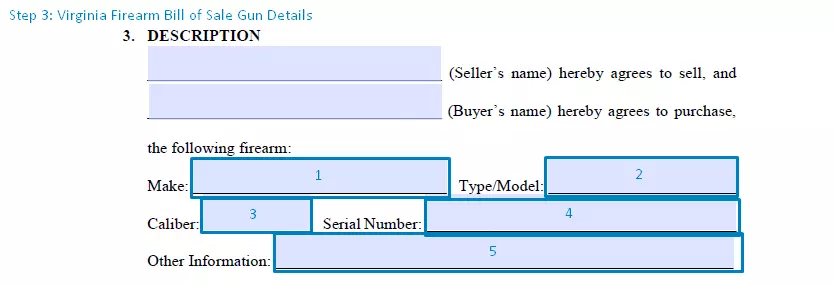
Step 4: Now, you need to choose the way you are going to be given money for the offer.
This part also requires indicating the date of the transaction and the full amount approved by both parties of the deal. Then, select one sale method:
- The overall sum at once. One of the more straightforward choices: the property owner is provided with the full sum from the buyer in a single transaction and presents the firearm to the buyer on the same day.
- Trade-in. In the event that this option is picked, the selling side trades their firearm for the firearm presented by the buyer. If the purchaser’s firearm is cheaper, they’ll need to even that out with an extra payment. The purchaser’s firearm details also have to be in the document.
- Installments. Enter the down payment sum as well as the exact date when it has to be given, along with the date by which the total amount has to be handed to the seller.
After that, select one payment method:
- Cash
- Cheque
- Cashier’s check
- Money order
The very last thing to complete within this section would be to choose if all applicable taxes are included in the purchase price.
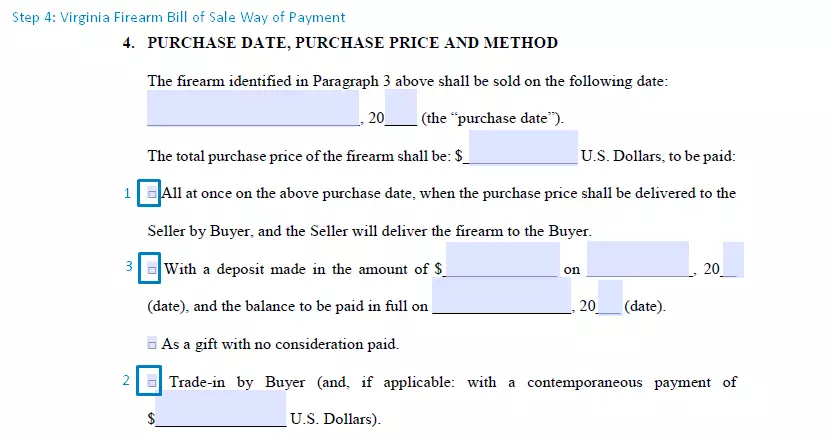
Step 5: Read through standard disclosures and terms and make sure all parties understand them.
These usually state that both sides agree with the disclosures required in firearm exchange and that the buyer acquires the property in “as-is” state and is liable for it after the purchase is finished.

Step 6: Place your signature(s) in the corresponding areas.
The consumer’s signature is typically not necessary. But, you’ll be more protected against legal problems if all parties sign the document. You could additionally have one or a number of witnesses attest the transaction.
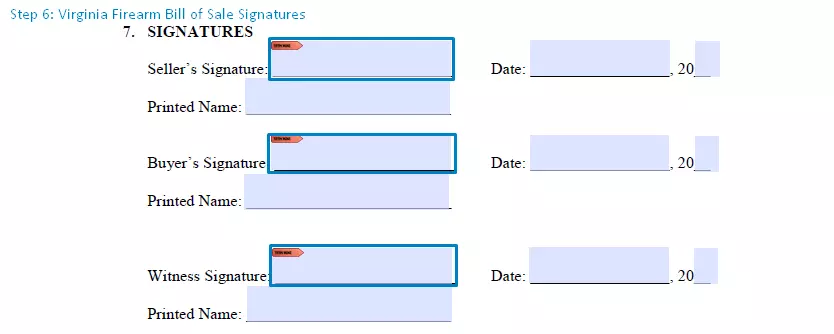
Step 7: Use the services of a notary public
Despite the fact that notarization is almost never mandatory, it functions as one more way to shield against legal problems. For more information regarding a firearm bill of sale, use our firearm bill of sale guide – https://formspal.com/bill-of-sale/firearm-bill-of-sale/.
In many states, a bill of sale document can be necessary for title transfer, so the purchaser should keep the original. There are two ways here: you need to either prepare and sign a pair of identical documents or make a duplicate for the seller to have.
